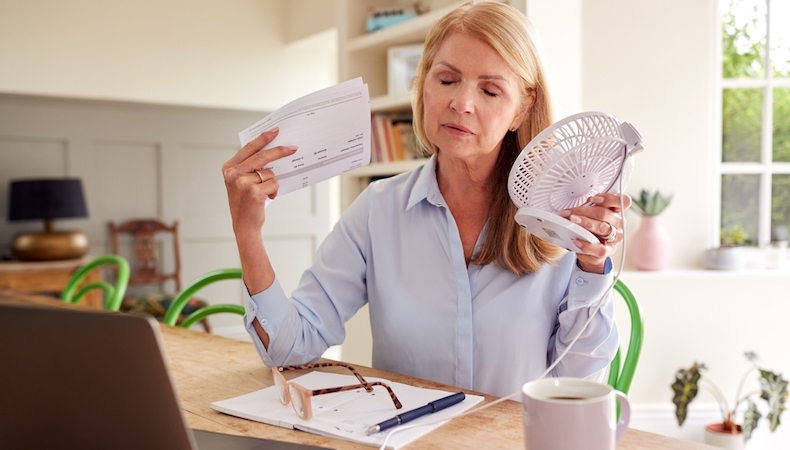Ways to support women’s health at work: start with awareness
Some women’s health conditions, such as period pain and menopause, have a huge impact on the careers of many talented employees. They also affect the organisations that employ them.
Period pain and menopause affect women, trans men and some non-binary and intersex people. Most of what we know about these conditions comes from studies of cis women and these statistics are used here. Cisgender means gender identity matches the sex assigned at birth.
Four in five women will experience period pain at some time.
For one in 10, menstrual pain is so intense it interferes with their daily lives.
While the stats highlight the challenges for women and workplaces, they also reveal an opportunity. Employers can provide more support and encouragement to ensure women are able to participate fully in the workplace.
Addressing the challenge
A Dutch study involving more than 32,000 women found that around one in seven are forced to take time off work because of menstrual pain. The study also found that menstrual pain led to presenteeism in eight out of 10 women.
And, a Bupa survey of 2,000 women revealed that almost a quarter (23%) had taken time off due to period pain in the previous six months.
Some charities and campaigners are calling for the UK government to follow Spain and introduce paid menstrual leave. YouGov polling shows that 45% of people support this.
Those most in favour are:
- 52% – more than half of women surveyed.
- 66% – two in three 18- to 29-year-olds.
This has huge implications in the competition to recruit and retain talent.
More women in work
Research from the Research Foundation shows that the Covid-19 pandemic has seen more women enter the workforce, especially those with children under the age of three. It suggests working from home and hybrid working has made this possible. Compared with 44% in 1992, women now make up 48% of the workforce.
Employment lawyers have identified menstrual leave as a key trend for employment law in 2023. The government put out a call for evidence for the Women’s Health Strategy for England. Almost half of the people who responded thought the strategy should include menstrual health.
The Strategy, published in August, found that only 17% of respondents felt women had enough information on menstrual wellbeing. Many believed health professionals were not listening to women.
Delayed diagnosis
Clinial lead for women’s health and Bupa GP Dr Samantha Wild says: “Women who took part in the consultation said they were often not listened to. Or they were told that heavy and painful periods are ‘normal’.”
But heavy and painful periods can be a sign of more serious problems, such as endometriosis, a debilitating condition that affects one in 10 women.
Wild says: “Endometriosis is linked to fertility problems and is the second most common gynaecological condition in the UK. On average, women struggle with symptoms for eight years before they finally get a diagnosis.”
She adds, “There is no cure, but that doesn’t mean women with endometriosis have to suffer in silence.”
Perimenopause are the years preceding a woman’s periods stopping. It’s another common cause of heavy periods and other menstrual changes. It is also associated with debilitating symptoms including hot flushes, poor concentration, low mood and self-esteem.
Women facing the menopause are the fastest growing demographic in the workplace. The Women and Equalities Committee points out: “Women in this age group are highly skilled and experienced. They are typically at the peak of their careers and are role models for younger workers”.
Effect on career
However, a survey of 3,800 women found that 99% thought their symptoms negatively affected their career.
- One in five (21%) had passed on a promotion
- Fewer than one in five (19%) had reduced their hours
- Just over one in 10 (12%) had quit
- Three in five (59%) had taken time off work
- Almost one in five (18%) had been absent for more than eight weeks
What employers can do
There’s no one-size-fits-all solution, but there are lots of simple adjustments that can make a big difference.
- Provide a fan or adjust air conditioning
- Provide easy access to cold water and washrooms
- Adapt uniforms for comfort, or allow staff to remove parts of their uniform
- Allow staff to request extra uniforms
- Have more flexible working options
- Make changes to shift patterns
- Allow more frequent toilet breaks
- Make sanitary products available in washrooms
- Provide a quiet space for time out
Support from Bupa
Bupa can support your organisation with a wide range of resources:
- A 24/7 menopause helpline
- Information, interactive tools and resources on the Bupa Women’s Health Hub
- Guides for line managers
- Menopause plan
- Period plan
Clinial Lead for Women’s Health and Bupa GP, Dr Samantha Wild, says: “Support for staff dealing with period pain and menopause symptoms should be a business priority. Organisations need to break old taboos and normalise conversations around these health issues. Those that offer effective support will have the edge when it comes to attracting and keeping talent.”
Supplied by REBA Associate Member, Bupa
Bupa's purpose is helping people live longer, healthier, happier lives and making a better world.








